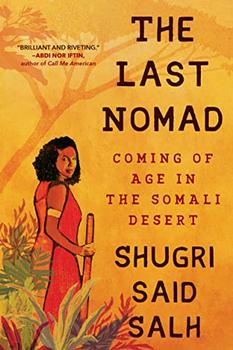Summary | Excerpt | Reading Guide | Discuss | Reviews | Beyond the Book | Readalikes | Genres & Themes | Author Bio

Coming of Age in the Somali Desert
by Shugri Said Salh
I sometimes experience visions of my nomadic life here in California, despite the twenty-plus years and thousands of miles of distance between me and my homeland. Am I trying to assuage a longing left unfulfilled, or do these visions exist to keep me grounded and remind me of my roots? Just the other day, as I was sitting in the sun in front of Whole Foods eating sushi, a woman passed me carrying an African-style basket and an empty plastic water jug. Instantly, I was standing in front of my desert hut, eyes fixed on the scorching terrain, waiting for a glimpse of my uncle to appear, leading our camel back from collecting water. Water was often a day away, sometimes more, and the wait was trying on my young body. I actually laughed out loud at how odd it was for someone to be fetching water in a place where it is just a faucet away.
Certain stretches of highway that meander through the hills and valleys near my Northern California home always remind me of the lands where I once lived. My innate compass guides me as easily through this maze of roads and highways as it did through the endless, unmarked terrain of the desert. Driving one day, my eyes scan the horizon as I've always done, in an instinctive search for danger. No lions or hyenas, but I spot a car ahead of me swerving erratically. As traffic slows around me, my eyes settle on the golden, dry grass and the scattered green trees, mimicking the landscape of my past. Suddenly, I see myself sitting under an acacia tree with my herd of goats, vigilant in my mission to protect my precious animals from hungry predators as I wait for the heat of the midday sun to abate.
As the traffic resumes its pace and I drive on, my thoughts deepen and I ponder the journey my life took to bring me to this very road. I begin to shake with laughter. The man driving the car next to me stares at me like I'm crazy. You have no idea who I am or where I come from, I think as he speeds away. Dear Strange Man, I am laughing in the comfort of my minivan, not because I am crazy, but because my journey to this highway began so very far away. It is ironic that I, of all my mother's nine children, am living this life. My mother's plan was for me to live permanently as a nomad, to be my grandmother's helper. Right now, I should be married to an old nomadic man, leading a nasty-tempered camel through the desert in search of water. If I failed to birth him sons or showed any signs of aging, he would not hesitate to take a younger wife. Despite my love for the culture and traditions of my youth, the guiding force of my grandmother, and my occasional longing for that simpler way of life, I am thankful for the life I have today.
My mother and father came from a world governed by a complex, conflict-filled clan system and the importance of your line of forefathers. A world where warring clans gave each other their young, virginal daughters to create allegiances and hoped-for peace. Could my parents ever have imagined a world where their desert daughter laughed with joy while skiing down a snowy mountain or drove endless hours to take her children to soccer practice, dance class, gymnastics, or simply to play with their friends?
As a teenager, my father left his family in the deserts of western Somalia, despite his mother's objection. He traveled a thousand kilometers, to Dire Diwe, Ethiopia, to get an education, and he never looked back. While visiting his nomadic sister decades later, my father spotted my fifteen-year-old mother herding her goats, her brown skin shimmering with the tone of the very desert she sprung from. He was instantly smitten by her beauty, but when he asked to take her hand in marriage, her mother refused. The men of her clan intervened, my grandmother relented, and my mother moved to the city with him.
My young mother found it more painful to disentangle herself from nomadic life than my father had. She was close to her mother and still wanted to be near her. She visited her mother often and sent each of us to stay with her mother—our ayeeyo—from time to time, usually during the rainy season so we could get fat and healthy. When I was a baby, my grandmother carried me on her back as she herded her goats and sheep, singing me old lullabies as she walked. As I got a little older, I sat by the fire while she told me stories and recited poems. My ayeeyo was a tall, regal woman who kept me close at night while the calls of lions and hyenas echoed in the distance. From my earliest childhood, my ayeeyo taught me how to be brave and resilient.
Excerpted from The Last Nomad by Shugri Said Salh. Copyright © 2021 by Shugri Said Salh. Excerpted by permission of Algonquin Books. All rights reserved. No part of this excerpt may be reproduced or reprinted without permission in writing from the publisher.
Your guide toexceptional books
BookBrowse seeks out and recommends the best in contemporary fiction and nonfiction—books that not only engage and entertain but also deepen our understanding of ourselves and the world around us.